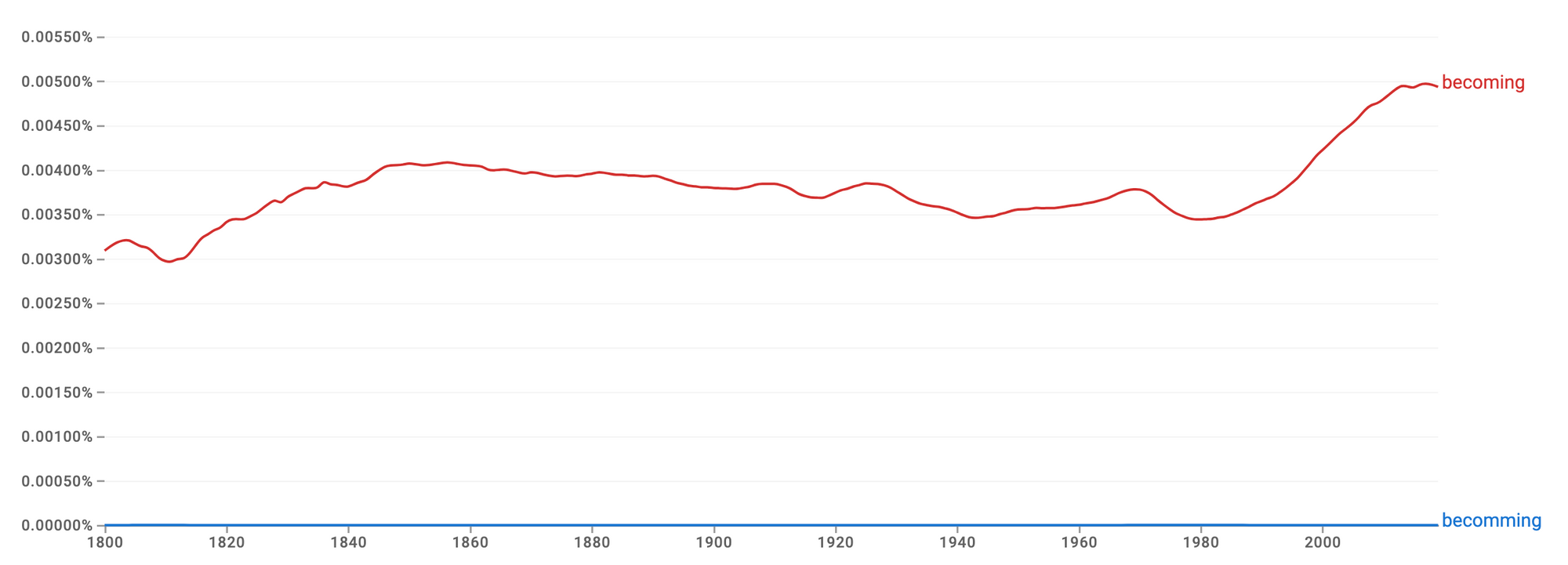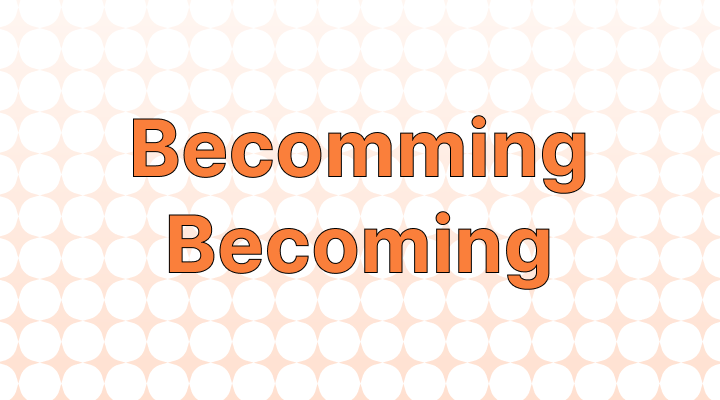- "Becomming" is an incorrect spelling of the word "becoming."
- Becoming is a present participle of the word "become", which means to undergo a process of transformation or change, evolving into a different state or condition.
❌ With each challenge she faced, she seemed to become more resilient and adaptable.
✅ With each challenge she faced, she seemed to become more resilient and adaptable.
In this context, "become" describes the process of transformation, specifically the development of resilience and adaptability over time.
What does "becoming" mean?
"Becoming" is the present participle of the verb "become", signaling change, emergence, and transition. Depending on the context, it can signify ongoing processes, specific moments of transformation, or broader philosophical constructs.
Key Factors:
- Processual Change: From a temporal perspective, "becoming" denotes the act of transitioning from one state to another. This ongoing process can be gradual or sudden, encompassing diverse aspects of life, such as personal growth, societal evolution, or natural phenomena. Imagine the caterpillar's "becoming" a butterfly or the Earth's "becoming" greener through environmental efforts.
- Moment of Transformation: Beyond continuous change, "becoming" can also represent a specific moment of significant transformation. This might involve reaching a milestone, experiencing a life-altering event, or acquiring a new identity. Think of a student "becoming" a graduate or an individual "becoming" an artist after taking up a new creative pursuit.
The concept of "becoming" finds application in various domains, including:
- Biology and Science: To describe processes of development, evolution, and transformation in living organisms and physical systems.
- Literature and Art: To depict characters' journeys of self-discovery, societal transformations, and the changing nature of human experience.
- Psychology and Personal Development: To analyze processes of personal growth, identity formation, and the ongoing evolution of the self.
- History and Politics: To understand societal change, revolutionary movements, and the dynamic nature of historical narratives.

The use of "becomming" and "becoming" over time
The Ngram graph below shows how often "becomming" and "becoming" have been used from the 1800s to the 2000s. "Becoming" has seen steady use until increasing in use from the 1980s-2000s, while its misspelling "becomming" has seen nearly zero use.

How to pronounce "becoming"
In both British and American English, "becoming" is pronounced like "buh·kuh·muhng".
This is just the standard pronunciation, and there may be slight variations depending on regional accents and individual speech patterns.
Why would we misspell "becoming" as "becomming"?
- Typo: "Becomming" could result from a typographical error where someone mistakenly adds an extra "m" while typing quickly or inattentively.
- Double Consonant Pattern: People might incorrectly associate "become" with words that follow a pattern of having a double consonant, like "running" or "planning." This false connection could lead them to add an extra "m" in "become."
Other common misspellings of "becoming"
- Becuming
- Becomig
- Beccome
- Becomingg
- Beocoming
Example sentences of the misspelling of "becoming" as "becomming"
- It's vital to recognize that "becomming" is not the correct spelling; the accurate term is "becoming."
- When discussing transformation or change, avoid the misspelling "becomming" and use the correct term, "becoming."
- Using "becomming" may lead to confusion; ensure you spell it correctly as "becoming" in your communication.
- Correct your spelling to "becoming" instead of "becomming" to accurately convey the idea of transformation.
- Don't compromise clarity by using the incorrect spelling "becomming"; the right term is "becoming."
Example sentences of "becoming"
- She is becoming more confident in her public speaking skills after regular practice.
- The student is becoming increasingly proficient in solving complex mathematical problems.
- With each new role, the actor is becoming a versatile performer in the entertainment industry.
- As technology advances, smartphones are becoming more powerful and feature-rich.
- The project manager is becoming adept at handling multiple tasks simultaneously.
- Through ongoing training, employees are becoming more skilled in using the latest software tools.
- The athlete is becoming a key player on the team, contributing significantly to their success.
- In the dynamic business environment, adaptability is becoming a crucial trait for success.
- As the company expands globally, its products are becoming available to a wider audience.
- The young artist is becoming known for their innovative and thought-provoking creations.
🖊️ Occured or Occurred: Which Is Correct?
🖊️ Adicted vs. Addicted: Which is the Correct Spelling?
Synonyms for "becoming"
- Transforming
- Evolving
- Developing
- Changing
- Turning into

Want to sound like a native speaker?
Engram’s AI-powered grammar checker makes your English sound like a native speaker’s, suggesting natural English expressions on top of fixing grammar, spelling, punctuation, word order, and vocabulary.

References:














